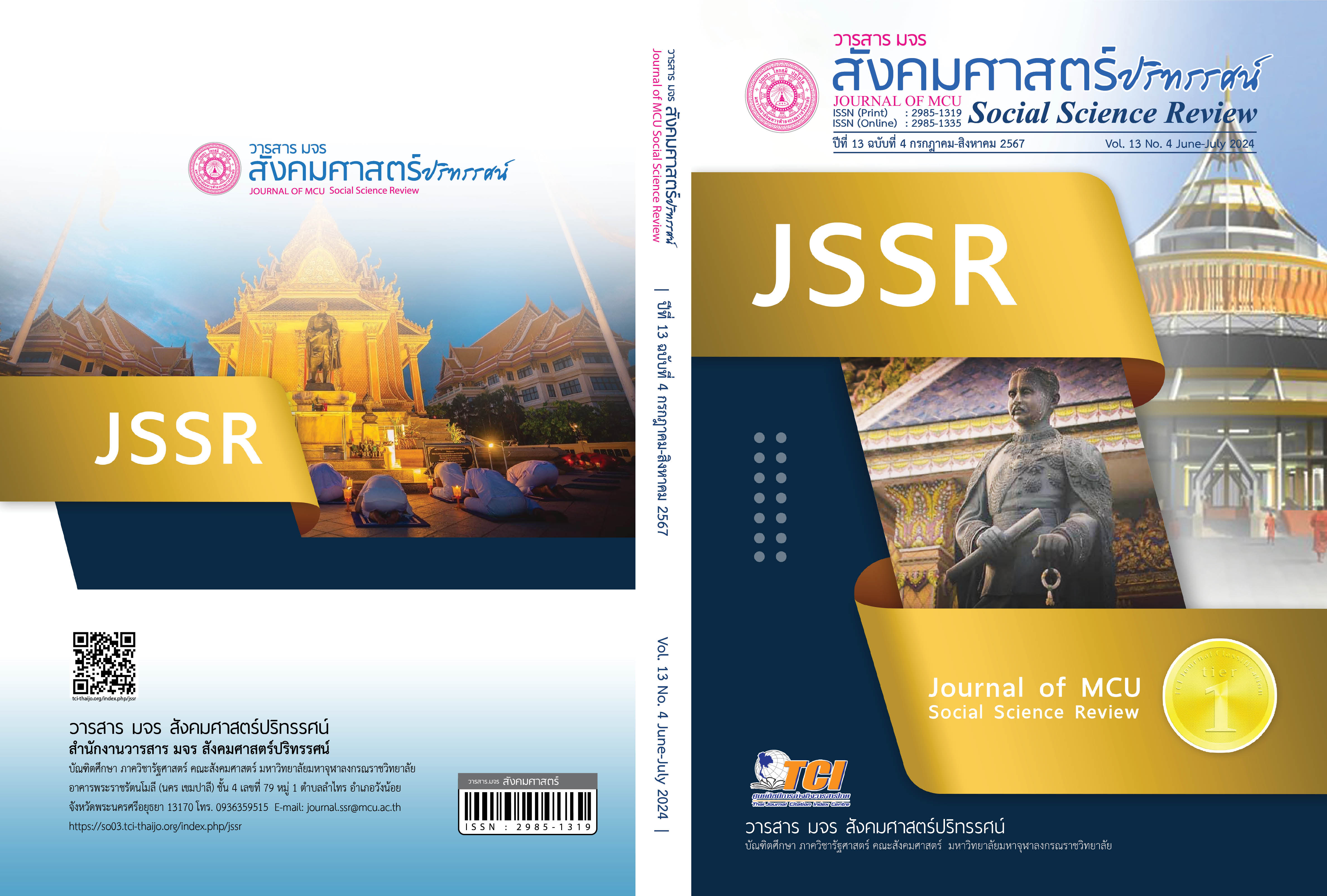การสร้างและพัฒนาชุดกิจกรรมการเรียนรู้วิถีพุทธ สำหรับนักเรียนระดับชั้นประถมศึกษาปีที่ 4-6
คำสำคัญ:
การสร้างและพัฒนาชุดกิจกรรม, การเรียนรู้วิถีพุทธ, นักเรียนระดับชั้นประถมศึกษา ปีที่ 4-6บทคัดย่อ
บทความวิจัยนี้มีวัตถุประสงค์ 1. ศึกษาสภาพและปัญหากิจกรรมการเรียนรู้วิถีพุทธ 2. สร้างและพัฒนาชุดกิจกรรมการเรียนรู้วิถีพุทธ 3. ประเมินประสิทธิผลและประสิทธิภาพการเรียนรู้วิถีพุทธสำหรับนักเรียนระดับชั้นประถมศึกษาปีที่ 4-6 เป็นการวิจัยแบบผสมวิธีพหุระยะ โดยระยะที่ 1 ใช้การวิจัยเชิงปริมาณและเชิงคุณภาพ ด้วยการสอบถามนักเรียน 382 คนและสัมภาษณ์ จำนวน 15 รูปหรือคน วิเคราะห์ข้อมูลด้วยการหาค่าร้อยละ ค่าเฉลี่ยและส่วนเบี่ยงเบนมาตรฐาน ระยะที่ 2 การสนทนากลุ่ม จำนวน 10 รูปหรือคน ระยะที่ 3 ใช้การวิจัยเชิงปริมาณ จำนวน 382 คน
ผลการวิจัยพบว่า 1. สภาพและปัญหากิจกรรมการเรียนรู้วิถีพุทธยังขาดบุคลากรที่มีความรู้ ความสามารถทางด้านพุทธศาสนาที่ลึกซึ้งในการจัดกิจกรรมทางพุทธศาสนาทั้ง 3 กิจกรรม คือ 1. กิจกรรมให้ความรู้เกี่ยวกับความสำคัญของพระพุทธศาสนา 2. กิจกรรมการเรียนรู้วิถีพุทธ โดยใช้ศีล สมาธิ ปัญญาเป็นฐาน 3. กิจกรรมการปฏิบัติตนเป็นศาสนิกชนที่ดี
2. ผลการสร้างและพัฒนาชุดกิจกรรมการเรียนรู้วิถีพุทธใน 4 ขั้นตอน ได้แก่ ขั้นที่ 1 การประสานความร่วมมือ ขั้นที่ 2 ศึกษาสถานการณ์ปัญหาและการสร้างทางเลือก ขั้นที่ 3 พัฒนาชุดกิจกรรมการเรียนรู้วิถีพุทธ ขั้นที่ 4 ประเมินชุดกิจกรรมการเรียนรู้วิถีพุทธ 3. ผลการประเมินประสิทธิผลและประสิทธิภาพการเรียนรู้วิถีพุทธสำหรับนักเรียนระดับชั้นประถมศึกษาปีที่ 4-6 พบว่า ความคิดเห็นอยู่ในระดับมากที่สุด คือ ด้านความเป็นไปได้ในการนำไปใช้ รองลงมาคือ ด้านความมีประโยชน์ซึ่งช่วยให้ผู้เรียนได้ตระหนักถึงความรู้เกี่ยวกับความสำคัญของพระพุทธศาสนา เรียนรู้ถึงความสำคัญของพุทธศาสนาและสามารถนำมาประยุกต์ใช้ในชีวิตประจำวัน
เอกสารอ้างอิง
กระทรวงศึกษาธิการ. (2564). นโยบายรัฐบาล. สืบค้น 4 ตุลาคม 2564, จากhttp://www.onec.go.th/
พระครูสมุห์วิโรจน์ วรมงฺคโล. (2554). สภาพปัญหาด้านการสอนของพระสอนศีลธรรมในสถานศึกษา สังกัดสำนักงานเขตพื้นที่การศึกษาประถมศึกษา ราชบุรี เขต 2 (วิทยานิพนธ์พุทธศาสตรมหาบัณฑิต สาขาวิชาการจัดการเชิงพุทธ). พระนครศรีอยุธยา: มหาวิทยาลัยมหาจุฬาลงกรณราชวิทยาลัย.
พระเทพโสภณ (ประยูร ธมฺมจิตฺโต). (2546). ทิศทางการศึกษาไทย. กรุงเทพฯ: โรงพิมพ์มหาจุฬาลงกรณราชวิทยาลัย.
พระพรหมคุณาภรณ์ (ป.อ. ปยุตฺโต). (2547). การศึกษาเริ่มต้นเมื่อคนกินอยู่เป็น. กรุงเทพฯ: อุษาการพิมพ์.
พระสถิต มหาลาโภ . (2553). การสอนวิชาพระพุทธศาสนาของพระสอนศีลธรรมในโรงเรียนวิถีพุทธ: กรณีศึกษาโรงเรียนบ้านโนนม่วง ตำบลศิลา อำเภอเมือง จังหวัดขอนแก่น (วิทยานิพนธ์พุทธศาสตรมหาบัณฑิต สาขาวิชาพระพุทธศาสนา). พระนครศรีอยุธยา: มหาวิทยาลัยมหาจุฬาลงกรณราชวิทยาลัย.
วีรนุช สุทธพันธ์. (2558). รูปแบบการบริหารจัดการโรงเรียนวิถีพุทธที่มุ่งเน้นจิตอาสาของนักเรียนประถมศึกษา. วารสารวิชาการมหาวิทยาลัยอีสเทิร์นเอเชีย ฉบับสังคมศาสตร์และมนุษยศาสตร์, 5(2), 112-121.
มณี ครไชยศรี. (2550). การจัดกิจกรรมพัฒนาผู้เรียน ตามหลักสูตรการศึกษาขั้นพื้นฐานโรงเรียนมงฟอร์ตวิทยาลัย จังหวัดเชียงใหม่ (วิทยานิพนธ์ศึกษาศาสตรมหาบัณฑิต สาขาวิชาการบริหารการศึกษา). เชียงใหม่: มหาวิทยาลัยเชียงใหม่.
รัชฎาพร จันภิรมย์. (2559). การศึกษาการจัดกิจกรรมส่งเสริมการเรียนรู้ตามหลักไตรสิกขาของนักเรียนโรงเรียนมัธยมศึกษา อำเภอบางปะอิน จังหวัดพระนครศรีอยุธยา (วิทยานิพนธ์พุทธศาสตรมหาบัณฑิต สาขาวิชาการบริหารการศึกษา). พระนครศรีอยุธยา: มหาวิทยาลัยมหาจุฬาลงกรณราชวิทยาลัย.
สำนักงานคณะกรรมการการศึกษาแห่งชาติ. (2544). พระราชบัญญัติการศึกษาแห่งชาติ พ.ศ. 2542 และที่แก้ไขเพิ่มเติม (ฉบับที่ 2) พ.ศ. 2545. กรุงเทพฯ: สำนักงานคณะกรรมการการศึกษาแห่งชาติ.
สำนักงานคณะกรรมการพัฒนาการเศรษฐกิจและสังคมแห่งชาติ. (2560). แผนพัฒนาเศรษฐกิจและสังคมแห่งชาติ ฉบับที่ 12 (พ.ศ. 2560-2564). กรุงเทพฯ: โรงพิมพ์คุรุสภา.
ดาวน์โหลด
เผยแพร่แล้ว
รูปแบบการอ้างอิง
ฉบับ
ประเภทบทความ
สัญญาอนุญาต
ลิขสิทธิ์ (c) 2024 วารสาร มจร สังคมศาสตร์ปริทรรศน์

อนุญาตภายใต้เงื่อนไข Creative Commons Attribution-NonCommercial-NoDerivatives 4.0 International License.
เพื่อให้เป็นไปตามกฎหมายลิขสิทธิ์ ผู้นิพนธ์ทุกท่านต้องลงลายมือชื่อในแบบฟอร์มใบมอบลิขสิทธิ์บทความให้แก่วารสารฯ พร้อมกับบทความต้นฉบับที่ได้แก้ไขครั้งสุดท้าย นอกจากนี้ ผู้นิพนธ์ทุกท่านต้องยืนยันว่าบทความต้นฉบับที่ส่งมาตีพิมพ์นั้น ได้ส่งมาตีพิมพ์เฉพาะในวารสาร มจร สังคมศาสตร์ปริทรรศน์ เพียงแห่งเดียวเท่านั้น หากมีการใช้ภาพหรือตารางหรือเนื้อหาอื่นๆ ของผู้นิพนธ์อื่นที่ปรากฏในสิ่งตีพิมพ์อื่นมาแล้ว ผู้นิพนธ์ต้องขออนุญาตเจ้าของลิขสิทธิ์ก่อน พร้อมทั้งแสดงหนังสือที่ได้รับการยินยอมต่อบรรณาธิการ ก่อนที่บทความจะได้รับการตีพิมพ์ หากไม่เป็นไปตามข้อกำหนดเบื้องต้น ทางวารสารจะถอดบทความของท่านออกโดยไม่มีข้อยกเว้นใดๆ ทั้งสิ้น





